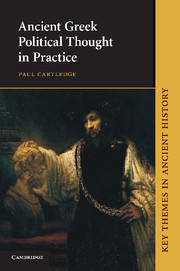Book contents
- Frontmatter
- Contents
- Preface
- Acknowledgements
- Timeline
- CHAPTERS AND NARRATIVES
- 1 Meaning in context: how to write a history of Greek political thought
- 2 The Greek invention of the polis, of politics and of the political
- Narrative I The prehistoric and protohistoric Greek world, c. 1300–750 BCE
- Narrative II The archaic Greek world, c. 750–500 BCE
- Narrative III The classical Greek world I, c. 500–400 BCE
- 6 The human measure: the Greek invention of political theory, c. 500–400 BCE
- 7 The trial of Socrates, 399 BCE
- Narrative IV The classical Greek world II, c. 400–300 BCE
- Narrative V The Hellenistic Greek world, c. 300–30 BCE
- Narrative VI ‘Graecia capta’ (‘Greece conquered’), c. 146 BCE – CE 120
- APPENDIX I Selected texts and documents
- APPENDIX II The ‘Old Oligarch’: a close reading
- Bibliographical essay
- References
- Index
7 - The trial of Socrates, 399 BCE
Published online by Cambridge University Press: 05 June 2012
- Frontmatter
- Contents
- Preface
- Acknowledgements
- Timeline
- CHAPTERS AND NARRATIVES
- 1 Meaning in context: how to write a history of Greek political thought
- 2 The Greek invention of the polis, of politics and of the political
- Narrative I The prehistoric and protohistoric Greek world, c. 1300–750 BCE
- Narrative II The archaic Greek world, c. 750–500 BCE
- Narrative III The classical Greek world I, c. 500–400 BCE
- 6 The human measure: the Greek invention of political theory, c. 500–400 BCE
- 7 The trial of Socrates, 399 BCE
- Narrative IV The classical Greek world II, c. 400–300 BCE
- Narrative V The Hellenistic Greek world, c. 300–30 BCE
- Narrative VI ‘Graecia capta’ (‘Greece conquered’), c. 146 BCE – CE 120
- APPENDIX I Selected texts and documents
- APPENDIX II The ‘Old Oligarch’: a close reading
- Bibliographical essay
- References
- Index
Summary
It has been well said that we tend to forget the value of freedom – until we have lost it. Freedom itself is an essentially contested concept (there is no universal agreement on one single core meaning), but there would, I imagine, be widespread assent to the proposition that for the West one particular freedom, freedom of speech, is the most fundamental civil liberty. Without it, there can be no others – or at any rate only in a distinctly weakened sense. There is a high price to be paid for free speech, however: the price of offence, even though feelings of being offended can arguably never by themselves justify any kind of official, state-imposed or state-directed censorship. The trial of Socrates, it has been often thought, constitutes a standing insult to that democratic civil liberty principle. One modern interpreter indeed (I. F. Stone [1988]) has gone so far as to claim that in trying and then condemning Socrates, a man of politically directed speech rather than political action, the democratic Athenians sinned against their own free-speech credo.
Stone was himself a major supporter of the Athenian style of democracy in general, but most intellectuals from Socrates' own day onwards have not been; indeed, they have pretty often been the reverse of supportive (Roberts 1994). One thinks, at once and above all, of Plato and his pupils, not excluding Aristotle, though the Stagirite was far more tolerant than his mentor had been of the majoritarian principle of decision-making as such.
- Type
- Chapter
- Information
- Ancient Greek Political Thought in Practice , pp. 76 - 90Publisher: Cambridge University PressPrint publication year: 2009
- 1
- Cited by



